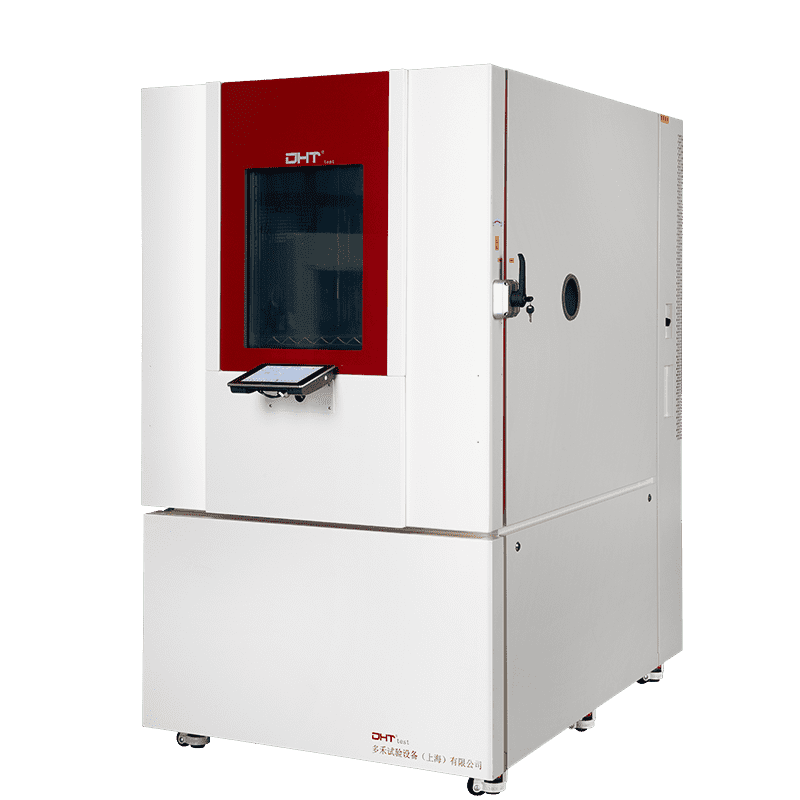Written by Shirley
Product Manager, Doaho Test (DHT®)
In the context of Industry 4.0 and the deep integration of smart manufacturing, environmental test chambers—once simple tools for temperature regulation—are now evolving into intelligent, connected, data-driven testing platforms. As a pioneer in this transformation, DHT® has developed a comprehensive product portfolio, including benchtop thermal chambers, thermal shock test chambers, sand and dust test lines, and climate test chambers. The offering also includes large-scale drive-in chambers for vehicle and system-level testing, as well as services for environmental chamber calibration to ensure ongoing precision and compliance. Through scenario-specific solutions tailored to industries such as electronics, defense, and new energy, DHT® empowers enterprises to upgrade their quality assurance systems.
1. Intelligent Temperature Control: Redefining Precision Standards
Traditional temperature chambers rely on manual calibration and mechanical control, which are vulnerable to environmental interference and offer limited accuracy. DHT® has developed its own adaptive temperature control algorithm, combining high-precision sensors with a modular refrigeration system to achieve temperature control accuracy of ±0.1°C. With temperature change rates of up to 15°C/min (linear) or 25°C/min (non-linear), these systems meet the rigorous requirements of IEC 60068-2 and other international standards, particularly for testing electronic components and 5G modules.
For example, the DHT® Rapid Temperature Change Test Chamber features a zoned airflow design and redundant cooling architecture to precisely simulate performance degradation under extreme temperature gradients—providing critical quality validation support for leading enterprises.
2. IoT-Enabled Lifecycle Management
The DHT® CloudLab Smart IoT Platform utilizes edge computing gateways to enable real-time equipment monitoring and localized data processing. Users can remotely adjust chamber parameters, receive anomaly alerts (e.g., compressor overload, humidity deviations), and automatically generate test reports compliant with ISO 17025 via mobile devices.
Case studies from a national-level lab in Beijing demonstrate that this solution has improved fault response efficiency by 60% and reduced manual intervention by 45%, making it ideal for electronics manufacturers with fast R&D cycles and dynamic testing needs.
3. Big Data for Deeper Test Insights
By integrating operational data with failure models, DHT® leverages big data analytics to deliver closed-loop testing services—from environmental simulation to root cause analysis. A notable example involves a new energy vehicle battery manufacturer, which used insights from over 100,000 temperature-humidity cycles to identify sealing process flaws, reducing defect rates by 8%.
Additionally, the platform’s predictive modules can optimize test plans based on historical trends—for instance, dynamically adjusting stress loading curves in three-combination chambers (temperature/humidity/vibration) to shorten validation cycles by up to 10%.
4. Customized Solutions for Industry-Specific Needs
DHT® offers customized systems across three core dimensions:
-Enhanced Safety Designs
Explosion-proof chambers tailored to UN38.3and UL 1642standards feature hydrogen concentration monitoring, inert gas fire suppression, and triple pressure relief systems—ensuring safety during thermal runaway testing of power batteries.
-Complex Environmental Simulation
Military-grade triple-prooftest chambers are equipped with titanium alloy spray towers and bio-grade antimicrobial coatings. These systems support continuous alternating tests for salt spray, damp heat, and mold (72 hours), fully compliant with GJB 150.9A-2009standards.
-Space-Conscious Solutions
Compact benchtop test chambers like the DHT-80F Seriesoccupy less than 0.5 m²of floor space while offering a wide temperature range of -70°C to 180°C, making them a cost-effective test chamber solution for space-limited laboratories.
5. Looking Ahead: From Smart Execution to Autonomous Decision-Making
Environmental test equipment is rapidly advancing toward a new phase of “cognitive intelligence.” DHT® is actively investing in next-generation technologies aimed at developing chambers with self-learning capabilities that can autonomously optimize test workflows based on historical data—enabling more efficient and accurate environmental simulations.
Conclusion
From simple temperature control to multidimensional environmental simulation, from local operation to cloud-based collaboration, the intelligent transformation of test chambers is reshaping the foundation of industrial quality systems. By focusing on precise control and data-driven insights, DHT® is leading the shift from equipment provider to full-spectrum quality service partner.
As intelligent manufacturing continues to surge, companies must leverage these test systems to build an end-to-end quality assurance ecosystem across R&D, production, and operations—securing a competitive edge in the global value chain.
FAQ – Frequently Asked Questions
Q1: How does big data analysis improve testing efficiency and quality insights?
A1: Data-Driven Closed Loop:
-
Root Cause Analysis: A new energy battery manufacturer identified sealing process flaws through the analysis of 100,000 temperature-humidity cycle data, improving yield by 8%.
-
Predictive Optimization: Dynamic adjustment of stress loading curves in three-combination test chambers (temperature/humidity/vibration), reducing validation cycles by 10%.
-
Technical Support: AI models integrate historical test data and failure mode libraries to provide parameter tuning recommendations, such as corrosion rate predictions in salt spray tests.
Q2: How do customized solutions meet the needs of specific industries? What safety designs should be focused on?
A2: Industry-Specific Solutions:
-
Explosion-Proof Design: For power battery testing, hydrogen concentration monitoring and inert gas fire suppression systems are integrated, complying with UL 1642 standards.
-
Military-Grade Environmental Simulation: Titanium alloy salt spray towers and bio-grade antimicrobial coatings support GJB 150.9A-2009 continuous alternating tests (salt spray/damp heat/mold for 72 hours).
-
Space Optimization: The DHT-80F series occupies less than 0.5m² of floor space and offers a wide temperature range from -70°C to 180°C, making it ideal for dense lab deployments.
Q3: How will the future “autonomous decision-making” feature change the testing process? What is the technical roadmap?
A3: Technical Evolution Direction:
-
Self-Learning Algorithms: Optimize testing processes based on historical data, such as automatically skipping invalid parameter combinations to improve efficiency (Goal: reduce test cycles by 20%).
-
Cognitive Intelligence: Test chambers can recognize product material characteristics and recommend optimal temperature change rates and humidity gradients, reducing manual intervention.
-
Application Scenarios: In semiconductor packaging testing, the equipment automatically matches the JEDEC standard curve, realizing the full loop of “Set Goal – Autonomous Execution – Feedback Optimization.”


